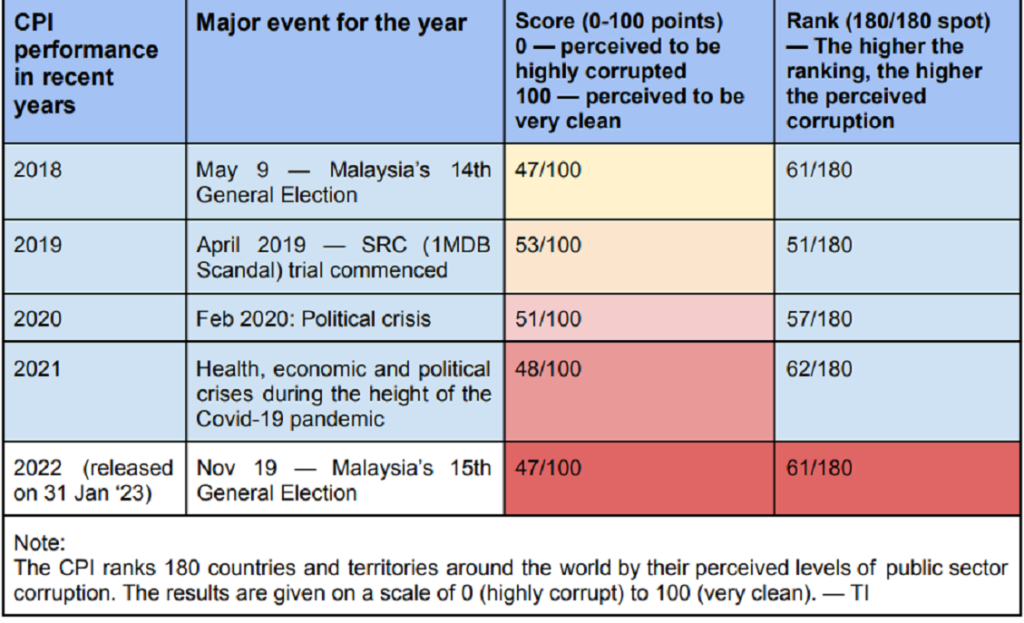
corruption perceptions index: Table courtesy of C4 Center.
KUALA LUMPUR, Feb 1 – Malaysia’s further drop to a score of 47 points on Transparency International (TI)’s Corruption Perceptions Index (CPI) 2022 from a previous score of 48 only ramps up the
urgency to fight corruption, says the Center to Combat Corruption and Cronyism (C4 Center).
In a statement today, C4 Center, said the results released Tuesday had highlighted weaknesses of the Malaysian government’s administrative framework and institutions in fighting corruption, potentially further permeating into the lives of the rakyat.
One of the main reasons for Malaysia’s deplorable score was the evident lack of political will
among lawmakers to strategically and effectively address corruption that, by now, has become
institutionalised, it said.
“The Center to is deeply troubled by Malaysia’s score of 47 points, ranked at the 61st spot alongside countries like China, Cuba Armenia and Jordan; backtracking by as many as six points within the span of these three to four years (2019-2022). The damaging result positions Malaysia as a struggling nation
desperate to rise beyond the worsening socio-political and economic depression perpetuated by
widespread corruption.”
Citing Prime Minister Datuk Seri Anwar Ibrahim’s statement last week that corruption was the nation’s main threat, C4 Center said it was now more important than ever for the Prime Minister to put into action his words by carrying out long overdue reforms.
“The continual slide in perceptions will also have a negative economic impact in terms of foreign investors’ confidence at a time when Malaysia needs all the support it can get to revitalise a troubled
economy.”
Among others, C4 Center urged the government to look into outstanding and critical reform efforts, particularly those aligned to the National Anti-Corruption Plan (NACP) 2019-2023 initiatives.
Expressing its readiness to assist with realising the many initiatives proposed under the NACP, the center recommended six measures including amending the existing Whistleblower Protection Act 2010 to allow disclosure to external parties, such as media, members of Parliament and civil society organisations.
It also repeated its call to reform the Malaysian Anti-Corruption Commission (MACC) to include granting it full independence and autonomy in their investigative capacity. It also suggested setting up an oversight entity to oversee MACC’s appointments for the post of Chief Commissioner, its budget, and manpower-related areas.
Other recommendations included separating the Attorney General and the Public Prosecutor office, and the enactment of the Political Funding/Financing Act to curb the culture of ‘money politics’.
It also proposed the legislation of a Public Procurement Act over the practice of merely issuing countless Treasury circulars and directives that have led to curb mass wastages, leakages and abuses in procurement of public projects, being the most vulnerable area of administration exposed to corruption.
“Having a law to govern it will minimise direct negotiations, thus increasing transparency and encouraging inclusivity for public participation and scrutiny in matters relating to procurement for the people’s welfare,” C4 Center said.
The government must also approach reforms with greater conviction and better engagement with civil society members as this will strengthen public confidence in the government’s commitment in the matter.
–WE